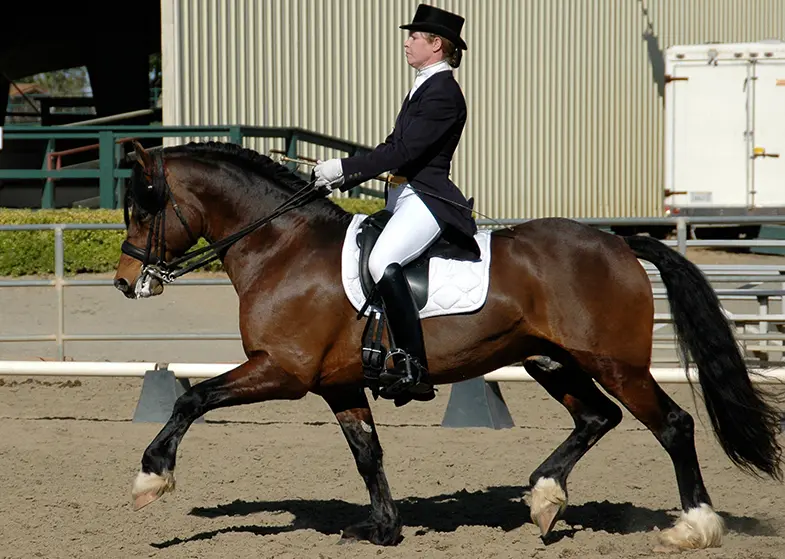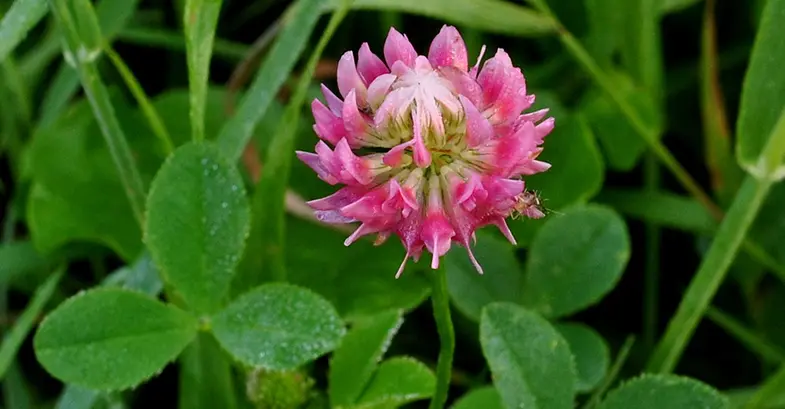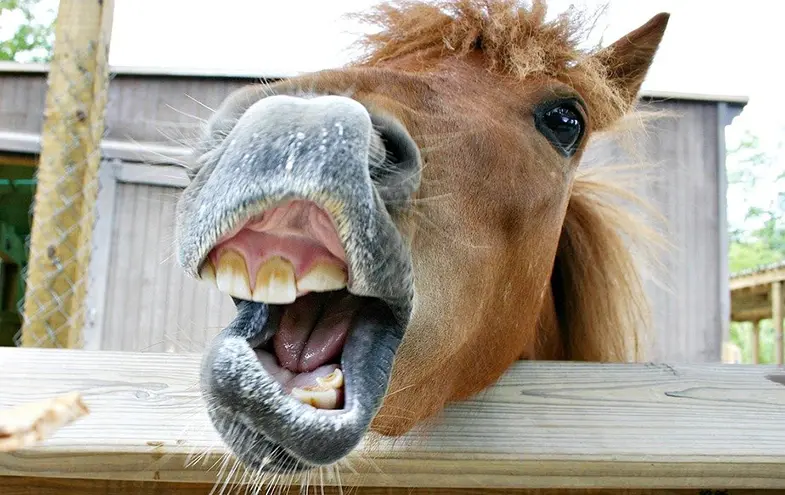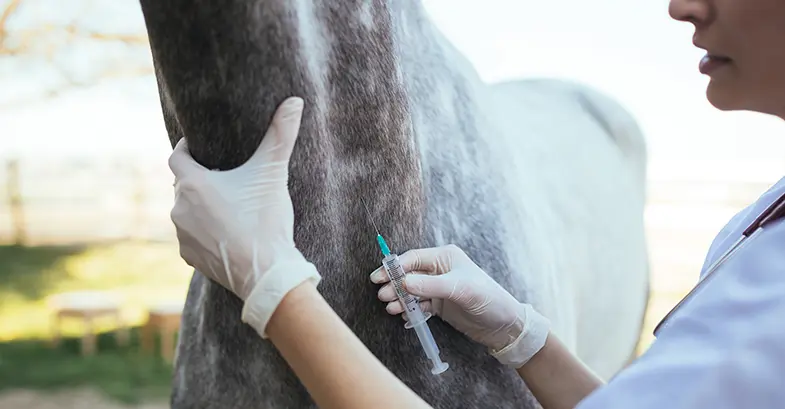If you’ve ever watched a horse being ridden, especially competitively, you may have noticed a white foamy substance collecting around the horse’s mouth, but what is it? Often referred to as hypersalivation or excessive salivation, this characteristic can be indicative of a number of different things in horses.
Why do horses foam at the mouth? Unlike with a lot of other animals, when a horse foams at the mouth it’s usually a good sign and is even a desirable trait in some disciplines. That said though, while foaming is generally a normal, healthy, function, in some cases, it can indicate some sort of health condition.
While foaming at the mouth can be a sign of a happy, relaxed and healthy horse it can also be a symptom of an underlying health problem or condition. In the vast majority of cases, a ‘foamy horse’ isn’t a cause for concern, especially when there are no other obvious signs. Instead, it’s better to assess your horse and the immediate situation before deciding the best course of action.
What actually is the foam around a horse’s mouth?
You might be surprised to know that generally, foam is nothing more than excess saliva that has been worked up into a foamy-like substance. This can happen when there’s friction (due to eating or the presence of the bit) or when there’s a lot of saliva that has been dried out slightly by the air.
Is foaming a good or bad thing?
In the vast majority of cases, foaming is a good thing that can show a horse is happy and healthy but there are some cases when it could be a sign of a serious medical problem. To understand whether your horse’s foaming is a good or bad sign it’s important to pay attention to when they’re doing it as well as the color of the foam itself.
If the foam is white and only happens when you’re riding or they’re eating then it’s probably a natal function. If however, your horse’s foam is pink or red in color then it could be there is some blood in the foam, if this is the case then, regardless of when they’re foaming you should speak to your vet for advice.
What causes a horse to foam at the mount?
As with so many things involving horses, there can be a variety of reasons why something happens and foaming at the mouth is no exception. In most cases, this appearance of foam in or around the mouth is a good sign but there are occasions when it can be an indication of something far more serious.
1 Relaxed and engaged with the rider
Sometimes referred to as ‘happy foam’, it’s a positive, and even encouraged, behavior that shows the horse is happy, relaxed, and is engaged with the rider. If your horse is tense or unhappy then his salivary duct is likely to be blocked which can lead to his mouth drying out and no saliva or foam being produced.
Some riders (especially dressage riders) encourage a horse to salivate and foam by feeding them something like an apple, carrot, or even a sugar cube before a competition. This stimulates the salivary gland which produces more saliva as a result, this then enables the mouth to soften and the horse to become more relaxed and responsive to your aids.
2 A tense or hard handed rider
While a horse that’s happy and engaged with its rider can foam at the mouth so can one that has a bad or tense rider. This might sound like I’ve just contradicted everything I said before but you’ll be able to tell the difference between a happy horse and a bad rider by the horse’s posture and overall demeanor.
Horses that appear to be relaxed and able to stretch are probably happy, especially if they have enough rein. If, however, the horse appears to be tense, has his head higher than normal, or tucked more underneath him than seems possible then it’s likely to be caused by the rider.
If you’re always pulling hard on the reins or forcing your horse to hold his head too high he won’t be able to close his mouth properly which will impair his ability to swallow. Not being able to swallow will mean that your horse can’t get rid of the excess saliva, this will therefore stay in their mouth and will start to foam up.
3 The horse is stressed or exerted
When I say stress I don’t necessarily mean bad stress (although that can be a cause), I mean horses that are putting stress on their bodies and cardiovascular systems. Much like we do in the gym, horses that spend their time running as fast as they can around their pasture are likely to work up a sweat and produce excess saliva too.
Any stress caused by hard work, whether it’s exercise, competition or simply playing in the field can result in a horse foaming and is absolutely nothing to worry about.
4 The bit isn’t correct or is poorly fitted
If your horse’s mouth is foaming more than you’d expect when you’re riding, and there are no other signs of anything being wrong, then it’s more than likely the foaming is caused by the bit either not being right or not in the right place.
The reason for this is that the bit breaks the natural suctioning of the lips which causes the air to mix with the saliva, this then mixes with the saliva, allowing foam to develop. This sort of foaming tends to happen in the front of the mouth instead of at the back.
5 A normal part of eating, drinking and chewing
Horses tend to eat a mainly dry diet that would be practically impossible to digest if they didn’t produce enough saliva to help them. As part of this digestive process, the saliva uses an enzyme known as amylase to help break the food down, the harder the food is to digest the more saliva is produced.
The amylase enzyme helps to digest the food by producing a paste that can give the appearance of foam, this is completely normal and a sign your horse is healthy. When you consider horses can produce between 3 and 10 gallons of saliva every day it’s no wonder they often foam when eating.
6 Slobbers!
Also known as clover slobbers, this is generally classed as drooling (or foaming) for no obvious reason but is normally caused by a plant or fungus and is generally completely harmless.
The reason it’s sometimes called clover slobbers is that the clover is one of the most common culprits, or at least the Rhizoctonia leguminicola fungus is. This fungus infects clover plants and is known to produce excessive saliva. The fungus is more common on white and red clover and can be identified by brown or gray spots on the leaves.
Generally, clover slobbers aren’t a cause for concern and will stop if the horse is removed from the clover (or the clover is removed from the horse’s field). If, however, they don’t stop after a few days then you should speak to your vet who will probably give your horse some antihistamine.
While I say the fungus isn’t harmful to horses it can be if it’s found on a plant known as alsike clover (pictured below). It can cause a condition known as Black Patch Disease which can be very serious if not treated promptly which is why it’s crucial to remove it all from your horse’s pasture.
7 A naturally forming protein in the saliva called Latherin
You might not have heard of Latherin before but it’s a natural protein that can be found in a horse’s saliva as well as in their sweat. As well as producing foaming around the mouth it can also create a white foamy substance around the horse’s chest and under the saddle.
The purpose of this protein is two-fold, in the saliva it can help the horse to break down dry food, therefore making it easier to digest. When it’s secreted with sweat though it can help a horse to thermoregulate their body temperature, helping them to keep cool in the summer.
On a separate note, it’s also believed that Latherin is why some people are allergic to horses. It’s thought that people are in fact suffering a reaction to the protein rather than to the horse, although this isn’t known for sure [source].
8 An injury to the mouth
Horses are no different to us sometimes, just like us they can get sores and ulcers in their mouth and, just as we do, they can also use their tongue to fiddle and play with these sores. This constant movement of the tongue naturally leads to an increased amount of saliva along with more foaming around the mouth.
It’s not known exactly why horses do this (or even why we do it for that matter), but while it can be difficult to stop fiddling with a sore, doing so can have some healing properties. Saliva contains naturally a good helping of antibacterial compounds (such as lysozyme, peroxidase, and cystitis) that are designed to help wounds heal.
9 Dental issues or diseases
Dental problems can be a common cause of ‘negative’ foaming in horses, in part because they continually grow and aren’t always ground down evenly. This can lead to ulcers and gum infections so you should speak to your vet for advice, especially if there’s blood in the foam.
Other dental issues that can cause a horse to foam at the mouth are:
- Excess plaque build up
- Too much tartar
- Loose or missing teeth
- Misaligned bite
- Bleeding gums
- Bone spurs
10 Choking
If there’s a lot of excess foam around your horse’s mouth and he’s coughing a lot then he may well have something stuck in this throat. It might only be something little but it’s important to call your vet immediately as this could be very serious.
Horses don’t often choke but when they do, not only are their airways sometimes blocked but they can also breathe in fluid or solid foods that can cause infections in the lungs which is why medical attention is so important.
11 A toxicity build up
While toxicity build is generally uncommon, it can go unnoticed for a long time and can often first show itself when a horse starts to foam at the mouth. You might not realize it but there can be a number of different causes of a toxicity build-up, things to look out for are:
- Poison – While we all know that some plants can be poisonous to horses you might not realise that some chemicals can have the same effect on your horse. This is why you shouldn’t use harsh chemicals to clean anything your horse can come into contact with.
- Heavy metals – Heavy metals such as lead, mercury, arsenic and even cadmium can all be harmful to horses and lead to a toxicity build up. You should check pastures, soil and water regularly for any harmful heavy metal contaminants.
- Organophosphate – Organic chemicals such as pesticides generally aren’t harmful to horses is small doses but in large doses can be extremely poisonous and toxic to horses.
12 Bacterial infections
Some bacterial infections can cause a horse to excessively drool which can often turn to foam in the corners of the mouth and along the lips. It’s not necessarily the infection itself but an indirect symptom of it, for example, because the horse isn’t able to close its mouth properly.
The most common reasons for bacterial foaming are:
- Actinobacillosis – More commonly known as wooden tongue, its a bacterial disease that’s more common in cattle but can still affect horses. It’s characterized by large abscesses that grow on the tongue rather like tumours. While it can be fatal, if spotted and treated earlier enough the prognosis is extremely good.
- Equine grass sickness – Unlike wooden tongue, grass sickness is sadly more fatal, especially if a horse is foaming. If your horse is foaming and also has other symptoms such as muscle tremors, smelly nasal discharge and increased heart rate you should call your vet immediately.
13 Rabies
You might not realize it but horses are just as likely to get rabies (which is often spread by wild animals such as bats, raccoons, foxes, skunks, and a variety of other creatures) as we are. As well as foaming horses with rabies are often restless, start making strange sounds, and can become uncharacteristically and unexplainably aggressive.
In the vast majority of cases, rabies is fatal but the good news is that there is a simple vaccination that can prevent the condition. The rabies vaccine is considered a core vaccine by the American Association of Equine Practitioners so it’s easy to get your horse vaccinated.
14 Vesicular stomatitis
Vesicular stomatitis is a serious, but rarely fatal, viral disease that causes blistering in and around a horse’s mouth as well as on their tongue, ears, udder, and other exposed soft tissue. The disease is normally transmitted by biting flies and midges so an effective fly management plan is essential.
Horses suffering from vesicular stomatitis often lose weight, not as a symptom but as an effect because the blisters make it difficult for them to eat.
15 Other diseases and conditions
While being rare there are a number of other diseases and conditions that can cause foaming of the mouth in horses:
- Borna disease – A rare disease that can also cause paralysis in horses.
- Equine Viral Arteritis – A highly contagious virus that is often, wrongly, said to be a respiratory disease. Instead it’s can cause a number of problems such as pneumonia.
- Musculoskeletal deformities, especially of the face or neck
- Mouth & tongue deformities
- Gastric tumors
- Liver disease




